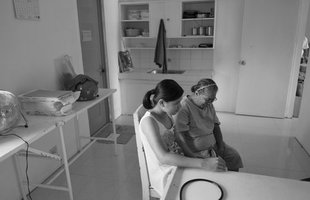
In the Western Pacific Region, mental disorders affects more than 100 million of the Region’s 1.8 billion people. Depressive disorders, suicides and the huge treatment gap for people with severe mental illnesses remain major public health challenges that affect many societies.
The discourse on mental health has traditionally been confined within the domain of mental health experts and professionals. However, the enormous magnitude of the problem demands cooperation from multiple sectors of society. Mental health for all can only be achieved if all are involved in the promotion and protection of mental health and well-being. Such social movements have proven instrumental in spurring progress in other public health domain such as sanitation, children's health and HIV-AIDS.
"In order to narrow the gaps between resources and mental health needs, we must create and maintain an environment that values, promotes and protects mental health," said Dr Shin Young-soo, World Health Organization (WHO) Regional Director for the Western Pacific. "We need to involve people with mental disorders and their families and engage support groups, mental health service providers and the public to overcome the stigma and discrimination attached to mental illness," he added.
Progress noted, but challenges persist
According to the WHO Mental Health Atlas 2014, Member States in the Western Pacific Region are developing plans, policies and laws for mental health. Seventy-four per cent of Member States have a mental health policy or plan and 59% have a stand-alone
law.
But the gap between policy and practice remains, with only 1% of the global health workforce dedicated to mental health. Where mental health policies exist, there is an urgent need to reinforce implementation. Less than US$ 2 per
capita per year is spent on mental health in low- and middle-income countries. Up to 90% of patients with severe mental illness in low- and middle-income countries do not have access to drugs and medicines.
WHO response
In 2007, the WHO Pacific Islands Mental Health Network was established to overcome the challenges faced by Pacific island countries in addressing mental health. Working together, network countries draw on their collective experience, knowledge and resources in order to promote mental health and develop mental health systems that provide effective treatment and care. The network is comprised of American Samoa, Australia, the Commonwealth of the Northern Mariana Islands, Cook Islands, the Federated States of Micronesia, Fiji, French Polynesia, Guam, Kiribati, the Marshall Islands, Nauru, New Zealand, Niue, Palau, Papua New Guinea, Samoa, Solomon Islands, Tokelau, Tonga, Tuvalu and Vanuatu.To guide Member States in developing and enforcing mental health policies and programmes, the sixty-fifth session of the WHO Regional Committee for the Western Pacific endorsed the Regional Agenda for Implementing the Mental Health Action Plan 2013–2020 in the Western Pacific.
The regional agenda guides Member States and WHO in implementing the Mental Health Action Plan 2013–2020. The action plan recognizes the essential role of mental health in achieving health for all people. It is based on a life-course approach, aims to achieve equity through universal health coverage and stresses the importance of prevention.
The regional agenda uses three strategic entry points to guide Member States in implementing the action plan: (1) a health systems approach; (2) a whole-of-government approach); and (3) a social movement approach to promote justice and equity for people affected by mental health disorders.
At a recent workshop to strengthen mental health policies and programmes in the Western Pacific Region hosted by WHO in Manila, participants from 17 Member States exchanged experiences, best practices and lessons learnt across countries and organizations on how to best address the issues posed by mental health.
Through the workshop, participants were guided on how to use the regional agenda to:
- assess the status, importance and feasibility of mental health interventions based on the four objectives of the Mental Health Action Plan 2013–2020;
- prioritize interventions in the form of key deliverables to implement;
- identify bottlenecks and barriers that hamper achievement of deliverables; and
- understand social movement as a key strategy for moving mental health at the top of the national and regional agenda.
"We need a social movement to create a society that cares for all its members, especially those with poor mental health. We can no longer look away. There is no health without mental health," said Dr Shin.




